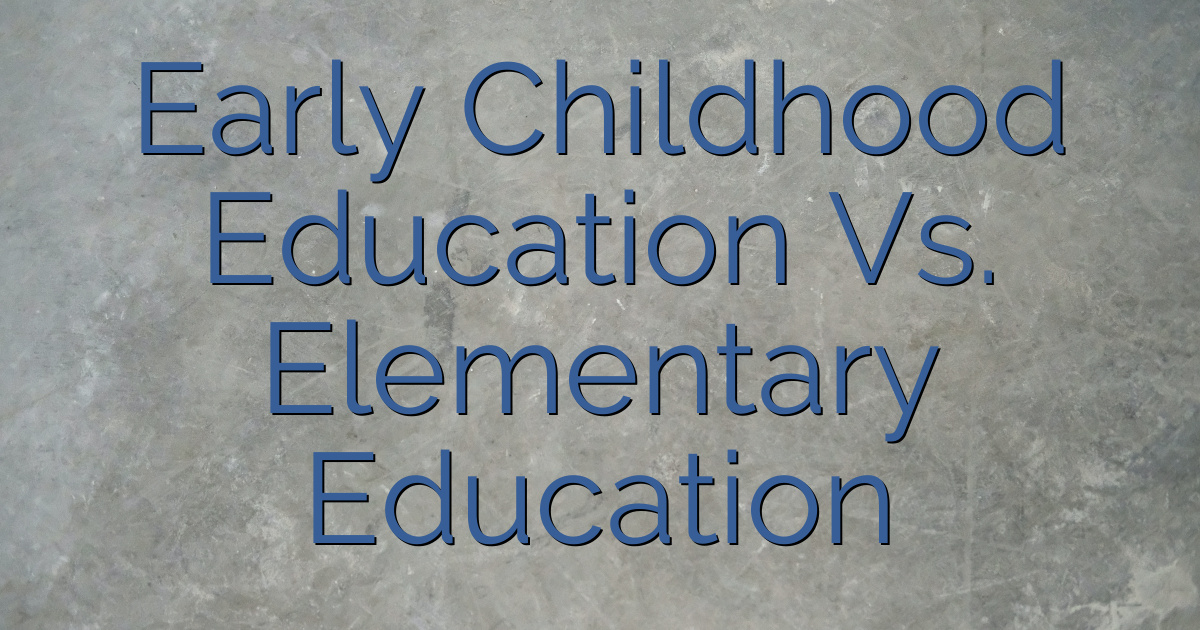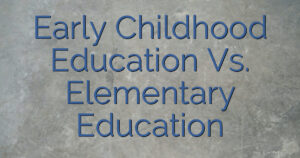 Imagine standing at a crossroads, unsure which path to take. You’re torn between two educational majors: Early Childhood Education and Elementary Education. Both hold promises of shaping young minds and making a difference. But which one is right for you?
In this article, we’ll explore the distinctions between these two paths. From curriculum to career prospects and salary potential, we’ll guide you through the factors to consider, helping you navigate this important decision.
So, let’s begin this journey of discovery together.
Imagine standing at a crossroads, unsure which path to take. You’re torn between two educational majors: Early Childhood Education and Elementary Education. Both hold promises of shaping young minds and making a difference. But which one is right for you?
In this article, we’ll explore the distinctions between these two paths. From curriculum to career prospects and salary potential, we’ll guide you through the factors to consider, helping you navigate this important decision.
So, let’s begin this journey of discovery together.
Table of Contents
Key Takeaways – Early Childhood Education Vs. Elementary Education
- Early childhood educators have a projected job growth of 7%, while elementary school teachers have a projected growth of 4%.
- Both fields have seen advancements in technology, with early childhood education using technology to enhance learning experiences and promote skill development in young children, and elementary education using technology to support classroom instruction.
- Early childhood education focuses on providing a nurturing and developmentally appropriate learning environment for children aged 0-8, while elementary education focuses on teaching children aged 6-12 in subjects like math, science, and language arts.
- Both majors develop strong communication and critical thinking skills through verbal and written communication with students, colleagues, and parents, as well as problem-solving skills to address individual student needs and adapt lesson plans to diverse learning styles.
Overview of the two education majors
If you’re trying to decide between early childhood education and elementary education, it’s important to have an understanding of the differences and similarities between these two majors. When it comes to job outlook, both early childhood educators and elementary school teachers are in high demand. However, the job growth for early childhood educators is projected to be higher, with a 7% increase compared to the 4% growth for elementary school teachers. In terms of technology, both fields have seen significant advancements. In early childhood education, technology is used to enhance learning experiences and promote skill development in young children. This includes interactive learning games, educational apps, and multimedia resources. On the other hand, elementary education utilizes technology to support classroom instruction, such as interactive whiteboards, online assessments, and virtual learning platforms. Both early childhood education and elementary education are rewarding career paths, but understanding the job outlook and impact of technology can help you make an informed decision about which major aligns best with your interests and goals.Overview of the curriculum and teaching methods of the two majors
The curriculum and teaching methods differ between the two majors. In early childhood education, the focus is on providing a nurturing and developmentally appropriate learning environment for children aged 0-8. The curriculum includes subjects like child development, early literacy, and play-based learning. Teaching techniques involve hands-on activities, storytelling, and interactive games to engage young learners. On the other hand, elementary education focuses on teaching children aged 6-12 in subjects like math, science, and language arts. The curriculum is more structured and includes standardized testing. Teaching techniques involve direct instruction, group work, and project-based learning. The differences in curriculum and teaching methods highlight the unique needs and characteristics of each age group, preparing educators to meet the specific challenges and opportunities of early childhood and elementary education.- Early childhood education: fostering a love for learning through play
- Elementary education: preparing students for academic success
- Early childhood education: nurturing social and emotional development
- Elementary education: building critical thinking and problem-solving skills
Overview of coursework, assessments, and teaching practicum experiences
Coursework, assessments, and teaching practicum experiences differ between the two majors, providing students with practical skills and knowledge to excel in their future careers as educators. In early childhood education, the coursework focuses on child development, curriculum planning, and age-appropriate teaching methodologies. Assessments in this major often involve observing children’s behavior, analyzing their progress, and designing individualized education plans. Teaching practicum experiences in early childhood education involve working with young children in daycare centers, preschools, or kindergarten classrooms. In contrast, elementary education coursework emphasizes subject-specific teaching methods, such as math, science, and language arts. Assessments in this major typically involve tests, projects, and group activities that evaluate students’ understanding and progress in various subjects. Teaching practicum experiences in elementary education often involve working with older students in elementary schools, where aspiring teachers can implement different instructional strategies and classroom management techniques. Overall, both majors provide students with diverse assessment techniques and teaching methodologies, ensuring they are well-prepared for their future roles as educators.Comparison of Skills Developed: Communication and Critical Thinking
You’ll develop strong communication and critical thinking skills in both early childhood education and elementary education, allowing you to effectively convey information and analyze complex problems. Here are four ways in which these skills are developed in both majors:- Verbal communication: Both majors require you to communicate verbally with students, colleagues, and parents, honing your ability to articulate ideas clearly and effectively.
- Written communication: In both majors, you’ll develop written communication skills through lesson planning, report writing, and documentation of student progress.
- Active listening: Both early childhood education and elementary education emphasize the importance of actively listening to students, colleagues, and parents, fostering effective communication and understanding.
- Problem-solving: Both majors require critical thinking skills to analyze and solve problems that arise in the classroom, such as addressing individual student needs or adapting lesson plans to meet diverse learning styles.
Comparison of Career Opportunities and Job Roles in Early Childhood Education Vs. Elementary Education
When comparing career opportunities and job roles, it’s essential to consider the unique aspects of each field. In early childhood education, you can pursue a variety of career paths such as becoming a preschool teacher, child care center director, or early intervention specialist. These roles allow you to work closely with young children, promoting their development and learning. On the other hand, in elementary education, you can work as an elementary school teacher, curriculum coordinator, or school administrator. These positions involve teaching a broader range of subjects to older children and managing the overall educational experience. Both fields offer opportunities for career growth, such as advancing to leadership positions or specializing in specific areas. Job satisfaction can be derived from the joy of working with children, making a positive impact on their lives, and witnessing their growth and progress.Comparison of Salary Potential in Early Childhood Education Vs. Elementary Education
If you’re considering a career in either field, it’s important to compare the salary potential in early childhood education versus elementary education. While both fields involve working with children, the salary prospects differ. According to the Bureau of Labor Statistics, the median annual wage for preschool teachers in 2020 was $31,930, while elementary school teachers earned a median annual wage of $60,660. This significant difference in salary can impact your financial stability and future goals. However, it’s essential to consider other factors such as job satisfaction and work-life balance. Early childhood educators often report high levels of job satisfaction due to the joy and fulfillment of working with young children. Additionally, they may enjoy more flexible work hours and shorter school days compared to elementary educators. Ultimately, it’s crucial to weigh the salary potential alongside factors like job satisfaction and work-life balance when deciding between early childhood education and elementary education.Similarities between Early Childhood Education and Elementary Education
To gain a deeper understanding of the field, it’s worth exploring the similarities between early childhood education and elementary education. Both fields share similar teaching strategies and focus on guiding children through important developmental milestones. In both early childhood and elementary education, teachers use a combination of play-based and hands-on activities to engage and educate young learners. They create safe and nurturing environments that promote social, emotional, and cognitive development. Additionally, both early childhood and elementary education emphasize the importance of individualized instruction and tailoring teaching methods to meet the unique needs of each child.Difference in job prospects between the two majors
The job prospects for early childhood education and elementary education majors differ. While both fields are in demand, the future job demand for early childhood education is expected to be higher. This is due to various factors, including an increased focus on early childhood development and the importance of quality education during these formative years. Early childhood educators are trained in specific teaching techniques that cater to young children’s unique needs and developmental stages. On the other hand, elementary education majors are responsible for teaching a broader range of subjects to older children. While both majors offer rewarding career opportunities, those with a degree in early childhood education may have more job opportunities and potential for growth in the future.Factors to consider when choosing between the two education majors
Now that you understand the difference in job prospects between early childhood education and elementary education, let’s discuss some factors to consider when choosing between the two majors. When deciding on your career path, it’s essential to weigh the career prospects and salary potential of each field. Here are a few things to keep in mind:- Career Prospects:
- Early Childhood Education:
- Growing demand for early childhood educators due to increased awareness of the importance of early childhood education.
- Opportunities to work in various settings, such as preschools, daycare centers, and early intervention programs.
- Elementary Education:
- Steady demand for elementary school teachers as the student population continues to grow.
- Possibility to specialize in a specific subject or grade level, providing more career opportunities.
- Salary Potential:
- Early Childhood Education:
- Generally lower salary compared to other education fields, but can increase with experience and additional qualifications.
- Elementary Education:
- Typically higher salary compared to early childhood education, with potential for salary increases with advanced degrees and experience.
What are the key differences between Early Childhood Education and Elementary Education?
Early childhood education focuses on pre-school aged children, aiming to develop their social, emotional, and cognitive skills. In comparison, elementary education covers the foundational skills and knowledge necessary for children in grades K-5. Both play crucial roles in nurturing young minds, but with different emphases and developmental stages.

